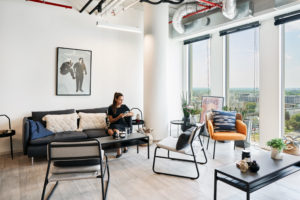



In this article, we unravel the contrasts between two office solutions, namely serviced offices and traditional ones.
Serviced offices offer fully private, furnished, and readily equipped workspaces, providing unparalleled flexibility, convenience, cost-effectiveness, and a range of amenities with minimal maintenance requirements. On the other hand, traditional offices necessitate investment in furniture, equipment, utilities, and ongoing maintenance.
By opting for serviced office solutions, businesses can channel their focus entirely on their core operations. At the same time, they will be able to enjoy networking opportunities with like-minded entrepreneurs.

New Work RM2 | Budapest | Hungary
Serviced office solutions vs. traditional office
Are you uncertain about whether a traditional or a serviced office is the optimal choice for your business?
In this text, we will provide clear definitions of flex and traditional offices, and delve into the significance of comprehending the distinctions between these two office solutions. Understanding these differences will help you make an informed decision when choosing the best workspace for your needs.
What’s a serviced office?
Also known as a flexible office, it is a dynamic workspace that offers more agility and adaptability to meet the changing needs of modern work patterns. In a flex office, businesses can lease space on a short-term basis (e.g., monthly or yearly) instead of committing to long-term leases.
Traditional office – refers to a fixed, dedicated physical workspace that is owned or leased by a company or organization. Traditional offices are more rigid in terms of structure. The tenant typically bears the responsibility for managing the space, utilities, and other office-related expenses.
Key differences lie in the: setup, structure and the approach to workspace solutions, i.e.

New Work HiPiotrkowska | Łódź | Poland
When choosing a flex office, you can rely on excellent customer care support and a wide array of available amenities, including:
| AMENITIES | FLEX | TRADITIONAL |
| Reception & concierge services at the office | ✔️ | X |
| Fast and secure network | ✔️ | X |
| IT support | ||
| Fully equipped kitchens and dining areas | ✔️ | X |
| Coffee, tea, water | ✔️ | X |
| Coworking space | ✔️ | X |
| Equipped meeting rooms | ✔️ | X |
| Furnished lounge space | ✔️ | X |
| Phone rooms | ✔️ | X |
| Daily cleaning service | ✔️ | X |
| Utilities (electricity, water, heating, cooling) | ✔️ | X |
| Inhouse maintenance services | ✔️ | X |
| Equipped printing/copy rooms | ✔️ | X |
| Ready sustainable design (e.g. energy efficient workspaces with natural light and ventilation, biophilic elements) | ✔️ | X |
| BENEFITS | ||
| Flexibility in occupancy (short term lease terms) | ✔️ | X |
| No up-front capital investment | ✔️ | X |
| All inclusive pricing | ✔️ | X |
| Ready to use solution | ✔️ | X |
| Networking opportunities | ✔️ | X |
Flex offices prioritize services, flexibility and convenience turning an office into an experience. Ultimately, the decision to choose a flex office comes down to your specific needs, working style, and business requirements. If you value flexibility, cost-effectiveness, and the opportunity to network, a flex office could be the ideal workspace solution for you.
Or share this news